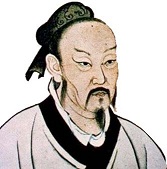Taoism > Masters > Chuang-tzu
We know fewer things about Chuang-tzu than about Lao-tzu. The main source of information is once again the historian Ssu-ma Ch'ien.
Chuang-tzu, the famous Lao-tzu's disciple, is best known because of his criticism of Confucian's social and political ideology |
Chuang had made himself well acquainted with all the literature of his time, but preferred the views of Lao-tzu, and ranked himself among his followers, so that of the more than ten myriads of characters contained in his published writings the greater part are occupied with metaphorical illustrations of Lao's doctrines.
Even more, Chuang-tzu becomes an indefatigable
critic of Confucius and his disciples. His critical work brilliantly combines satire and sophism.- Philosophy
Chuang was an admirable writer and skillful composer, and by his instances and truthful descriptions hit and exposed the Mohists and Literati. The ablest scholars of his day could not escape his satire nor reply to it, while he allowed and enjoyed himself with his sparkling, dashing style; and thus it was that the greatest men, even kings and princes, could not use him for their purposes.
His attitude towards life at the sovereign's court and, actually, towards everything regarding ceremony and ritual (paramount subjects of
Confucians) can also be inferred from the following occurrence related by the same Ch'ien:King Wei of Chou, having heard of the ability of Chuang-tzu, sent messengers with large gifts to bring him to his court, and promising also that he would make him his chief minister. Chuang-tzu, however, only laughed and said to them: "A thousand ounces of silver are a great gain to me, and to be a high noble and minister is a most honorable position. But have you not seen the victim-ox for the border sacrifice? It is carefully fed for several
years, and robed with rich embroidery that it may be fit to enter the Grand Temple. When the time comes for it to do so, it would prefer to be a little pig, but it cannot get to be so. Go away quickly, and do not soil me with your presence.
I had rather amuse and enjoy myself in the midst of a filthy ditch than be subject to the rules and restrictions in the court of a sovereign. I have determined never to take office, but prefer the enjoyment of my own free will.
One last account presents Chuang-tzu on his deathbed. Surrounded by his disciples, he speaks to them in his usual ironical manner, which goes straight to the point.
When Chuang-tzu was about to die, his disciples signified their wish to give him a grand burial. "I shall have heaven and earth", he said, "for my coffin and its shell; the sun and moon for my two round symbols of jade; the stars and constellations for my pearls and jewels; will not the provisions for my interment be complete? What would you add to them?" The disciples replied: "We are afraid that the crows and kites will eat our master." Chuang-tzu rejoined: "Above, the crows and kites will eat me; below, the mole-crickets and ants will eat me; to take from those and give to these would only show your partiality." (Quotes from James Legge: The Texts of Taoism, vol.XXXIX).
Read also:
-
Chuang-tzu Book (review and comments)
Further Resources:
-
Chuang-tzu and Formal Thinking (Paper)
Comments on the story of the death of Master's wife
The Meaning of the Butterfly Metaphor (Paper)
Commentary on the well-known butterfly parable (its meaning)
Teachings on Tao by Chuang-tzu (Ebook)
A collection of Master Chhuang's texts with commentaries by Jhian
At the Death of Lao-tzu
Commentary on a story dealing with the question if Lao-tzu was a true saint according to Chuang-tzu.
<= Back to Masters section of this site
Articles - CoursesPaperstore - Bookstore - PDFResources - AbstractsForum Newsletter - Search - Contact
Copyright Way of Perfect Emptiness, 2025. All rights reserved.
![]()
